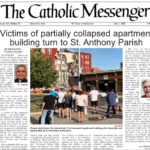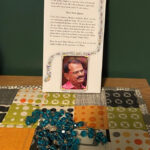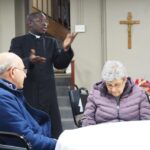The 1940s Broadway musical “Oklahoma” included a song and dance number with the line, “The farmer and the cowman should be friends.” It is part of a show featuring tension between people who wanted wide open spaces for cattle and horses as white folks moved into the American West and others who wanted to fence off parcels of land where they could plant crops and raise a family.
A young man and woman, a cowboy and a farmer’s daughter, are caught in the middle of this conflict. They need peace between those contending parties, those two different worlds, or their love will always be threatened by background division. The farmer and the cowman should be friends so the world of their children will be congenial to love rather than hate.
The story in “Oklahoma,” as in “Romeo and Juliet” and countless other similar dramas, is a piece of an older story we know as Original Sin — or original fracturing. From its beginning, the human story has put individual identity — me, mine, my way — against original unity, or love. We need both identity and unity in relationships, but integrating them is a perennial challenge for each of us and for our marriages, our families and our broader communities.
Islamic radicals in the Middle East and Africa are currently stoking identity conflict with every other religious family in their vision, even fellow Muslims of different views. They are noted for driving out Christians and for vicious brutality: chopping off people’s heads, burning them alive in cages, making sex slaves of young girls. It’s hard to look behind that savagery and see fellow human beings, but our own religious family requires that we make the effort.
Otherwise, Original Sin wins.
The Muslim and the Christian and the Jew and the agnostic should be friends. It isn’t just an old show tune sentiment.
Some religious persons may not be able to imagine any way other than the narrow one they know. They may genuinely believe that all other ways threaten their future. They may fear compromise as the death of their own identity, their own selfhood, and even avoid real dialogue because it might be a door to compromise.
We know about all of this from our own history. We Christians have stories of terrible brutality against others considered a threat to our identity, our truth – especially the Jews and Muslims and “heretics” we burned and put to the sword in medieval times. President Obama referred to this history in his remarks at the National Prayer Breakfast in Washington early this month. Some people were offended that he did this, but it seemed useful in the context of recent news about appalling violence among Muslim factions.
A reminder of our own sins can help prevent self-righteousness on this side of the religious divide.
Not that remembering sins is most important. It only calls us to be humble. Then comes the crucial moment. With humility it becomes possible to admit new light into our vision; to widen our view and begin to see this other, this “enemy,” as a fellow traveler within the light of God.
We become able to “turn away” from enmity, as the words of Ash Wednesday direct us. We may think we have good reason to see some people as enemies but by taking that stance we are less open to reconciliation, less tuned to God, more driven by vengeance and less careful about justice. We may not know how the bad guys will be stopped but we should remember that the power of God is seeded in faith, hope and, especially, love. Our first practical, concrete responsibility is to be peace-full in this way.
Lent this year seems to be a call for prayer on behalf of the victims in all sectarian violence and special prayer for the grace to see full humanity in everyone who appears to be an enemy.
Frank Wessling












Mr. Wessling,
It is a grave responsibility of the press, including editorialists, to research the facts before publishing their work. Here is a link to some history on the Inquisition by Professor Thomas Madden on staff at St. Louis U:
http://www.catholicculture.org/culture/library/view.cfm?id=5236&repos=1&subrepos=0&searchid=1499859
He has also written on the Crusades.